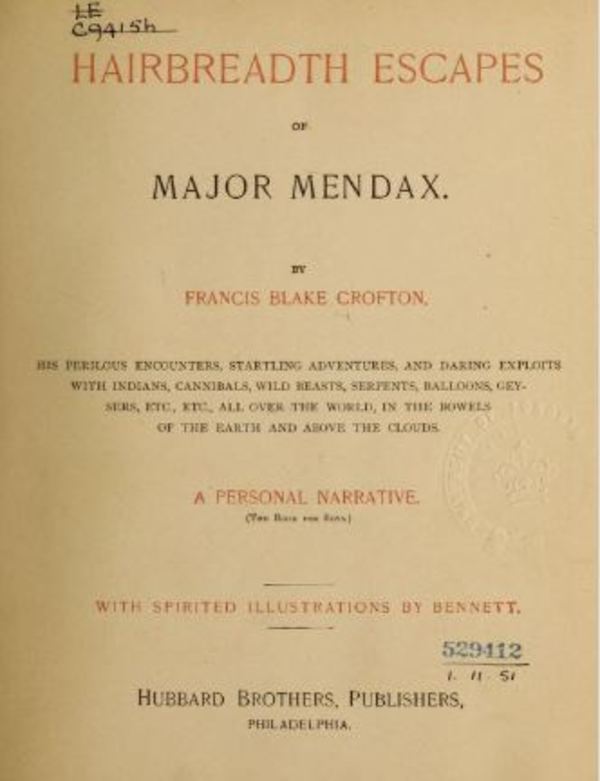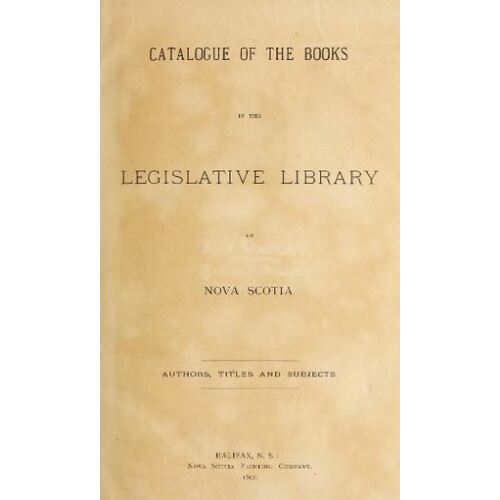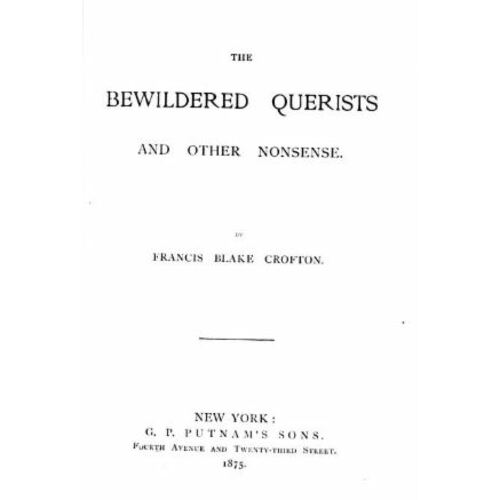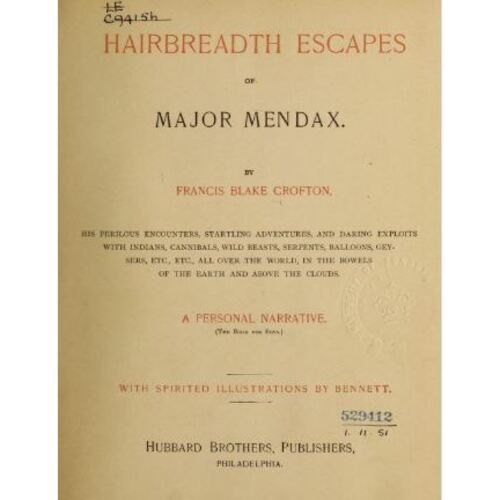
Source: Link
CROFTON, FRANCIS BLAKE, librarian and author; b. 17 July 1842 in Crossboyne (Republic of Ireland), youngest son of the Reverend William Crofton and Melesina (Milinises) Woodward; m. 12 Dec. 1872 Emma Catherine Bradshaw in Quebec City, and they had two sons and two daughters; d. 23 Oct. 1911 in the Southsea district of Portsmouth, England.
Francis Blake Crofton was educated at the Royal School, Dungannon (Northern Ireland), and Trinity College, Dublin, which he entered on a royal scholarship, and from which he graduated in 1863 with honours in English and classics. The following year he came to Canada, where he substituted for one year as professor of classics at Bishop’s College in Lennoxville, Lower Canada. Having subsequently moved to New York City, he spent the next decade contributing to American periodicals and newspapers there, including the Round Table, St. Nicholas, and the National Quarterly Review, as well as to the Union Jack (London) in England and the Canadian Monthly and National Review (Toronto). He also assisted in preparing sons of wealthy families for entrance into university.
In 1875 Crofton applied without success for the post of English master at the provincial Normal School in Truro, N.S. None the less, he moved there around 1877. When the position of librarian of the Nova Scotia legislature was offered in 1882 he was one of 14 candidates, “none of whom had practical experience.” Because of this discrepancy, after Crofton was chosen he was named library custodian on 3 Jan. 1883, with the understanding that his appointment as librarian would be confirmed a year later. Accordingly, on 3 Jan. 1884 he was established in that position.
Crofton had held the office barely a year when a local newspaper broke a story that was prompted by a letter written by his predecessor, John Thomas Bulmer*. Copies of valuable newspapers, which were the property of the Nova Scotia Historical Society, and which were housed in the Legislative Library, had been found to be wrapping fish and meat in the market. On Crofton’s order the library messenger, W. Coleman, had been charged to dispose of certain duplicate materials through sale to victuallers and barbers; Crofton, however, was not aware that the profit motive had prompted Coleman to pilfer from the permanent collection. There were cries of “library spoliation,” “too bad to be true,” and demands for Crofton’s resignation. After a thorough examination of the situation by the library commissioners, Crofton was absolved and Coleman dismissed, but the incident continued to be a contentious issue in the press for some time. Crofton seems eventually to have reinstated himself with the historical society, for his name frequently occurs in its minutes. Moreover, in 1888 he was appointed corresponding secretary, a position he held until 1902. He also contributed papers.
Though lacking formal training in librarianship, Crofton appears to have had an innate sense of library organization and administration. Despairing of the manuscript catalogue he had inherited from Bulmer, he proceeded to institute a dictionary card catalogue classified under author, subject, and title. Completed in 1889, it was published two years later and updated with supplements at intervals until his retirement in 1906. His correspondence with his peers, notably R. Edward Gosnell*, provincial librarian of British Columbia, indicates a sincere desire for library cooperation. Crofton’s concern for an orderly exchange of government documents, notably with the Library of Congress, reveals him to be a pioneer in this undertaking. His professional reputation was internationally recognized when he was made a vice-president of the International Library Conference and invited to give a paper at its second meeting in London, England, in July 1897.
Ill health in the form of neuritis forced Crofton to vacate his office on 30 Sept. 1906, assured of a pension by the legislature. Three years later he left Nova Scotia to make his home in the milder climate of Southsea, England, where he died.
Both Crofton’s correspondence and writings denote a man endowed with a facile pen and ready wit, yet one impatient with mediocrity. His choice of subject-matter was disparate: from a scholarly study of Thomas Chandler Haliburton*, Haliburton, the man and the writer . . . (Windsor, N.S., 1889), through a volume of verse, Sombre tints (Halifax, 1904), to the gentle satire of The bewildered querists and other nonsense (New York, 1875) and two stories of travel and adventure, The major’s big-talk stories (London, 1881) and Hairbreadth escapes of Major Mendax . . . (Philadelphia, 1889), which strongly resemble the tales of Baron Munchausen. As a staunch imperialist he pleaded the cause of imperial federation in newspaper and periodical articles, which were later published in two pamphlets.
Crofton’s erudition, Irish wit, and old-country background not only stood him in good stead in the conduct of the Legislative Library, which grew and prospered under his guardianship, but also guaranteed him entry into the literary and social life of late-19th-century Halifax. He held membership in the Royal Nova Scotia Yacht Squadron and the prestigious Halifax Club, where he was known to have played a superior game of whist. On his resignation as librarian in 1906 the library commissioners lauded him as “a Gentleman of education and high literary ability who has brought to the discharge of his functions intelligence, taste and historical apprehension.”
Francis Blake Crofton’s articles on imperial federation appeared in pamphlet form as For closer union: some slight offerings to a great cause (Halifax, 1897) and Is it too late? . . . (London, [1897?]), the latter issued anonymously “by an Irish-Canadian.”
Church of Jesus Christ of Latter-day Saints, Geneal. Soc. (Salt Lake City, Utah), International geneal. index. N.S., Legislative Library (Halifax), Legislative Library, letterbooks, 1883–1906; Nova Scotia Library, board of commissioners, minutes, 1883–1906. PANS, MG 20, 211: 197; MG 100, 128, no.14. South Mayo Family Research Soc. (Ballinrobe, Republic of Ire.), File information concerning the Crofton family. Acadian Recorder, 24 Oct. 1911. Morning Chronicle (Halifax), 24 Oct. 1911. Morning Chronicle (Quebec), 13 Dec. 1872. Morning Herald (Halifax), 31 Jan., 2, 18 Feb. 1885. Canadian men and women of the time (Morgan; 1898 and 1912). Dominion Illustrated (Montreal), 7 (1891): 95. Encyclopedia Canadiana, ed. K. H. Pearson et al. ([rev. ed.], 10v., Toronto, 1975). N.S., Legislative Library, Annual report of library commissioners and librarian (Halifax), 1884–1906.
Cite This Article
Shirley B. Elliott, “CROFTON, FRANCIS BLAKE,” in Dictionary of Canadian Biography, vol. 14, University of Toronto/Université Laval, 2003–, accessed December 31, 2025, https://www.biographi.ca/en/bio/crofton_francis_blake_14E.html.
The citation above shows the format for footnotes and endnotes according to the Chicago manual of style (16th edition). Information to be used in other citation formats:
| Permalink: | https://www.biographi.ca/en/bio/crofton_francis_blake_14E.html |
| Author of Article: | Shirley B. Elliott |
| Title of Article: | CROFTON, FRANCIS BLAKE |
| Publication Name: | Dictionary of Canadian Biography, vol. 14 |
| Publisher: | University of Toronto/Université Laval |
| Year of publication: | 1998 |
| Year of revision: | 1998 |
| Access Date: | December 31, 2025 |





